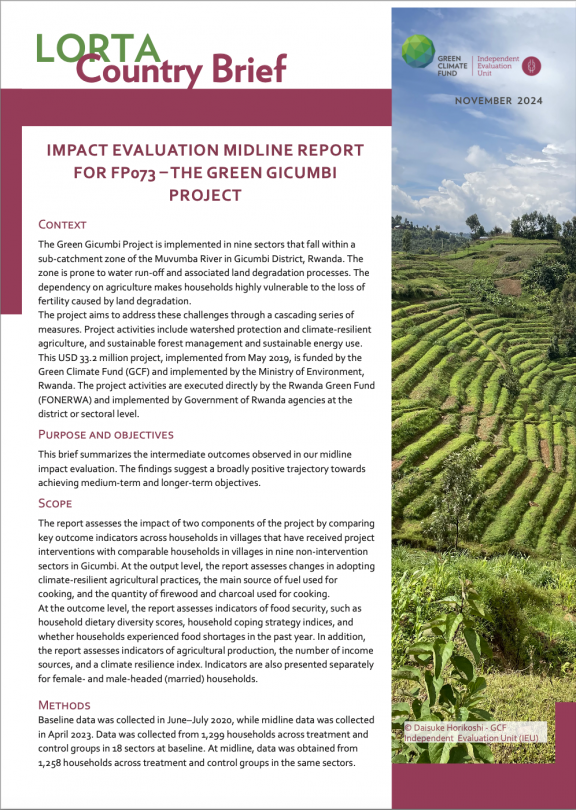FP073
Strengthening climate resilience of rural communities in Northern Rwanda (Gicumbi project)
Strengthening climate resilience of rural communities in Northern Rwanda (Gicumbi project)
This evaluation aims to understand the impact of the Green Gicumbi Project (FP073). The overall objective of the project is to increase the resilience of vulnerable communities to climate change in Gicumbi District in Northern Rwanda. The impact evaluation focuses on two sub-components of this project: watershed protection and climate resilient agriculture, sustainable forest management.
-
TopicAgriculture & adaptive livelihoods
-
Project componentLow adaptative capacity at the household, community and landscape levels. enhancing forest productivity and reducing deforestation.
-
Impact evaluation designDifference-in-Difference (DiD)
-
Target beneficiariesApproximately 248,907 people, or 63% of the Gicumbi District's population, living in nine sectors within the sub-catchment zone of the Muvumba river, which includes around 252 villages.
Timeline
Onboarded to LORTA
Nov 2019
Baseline data collected
Jul 2020
Midline data collected
Feb 2023
One region
- Africa
One country
- Rwanda
Reports
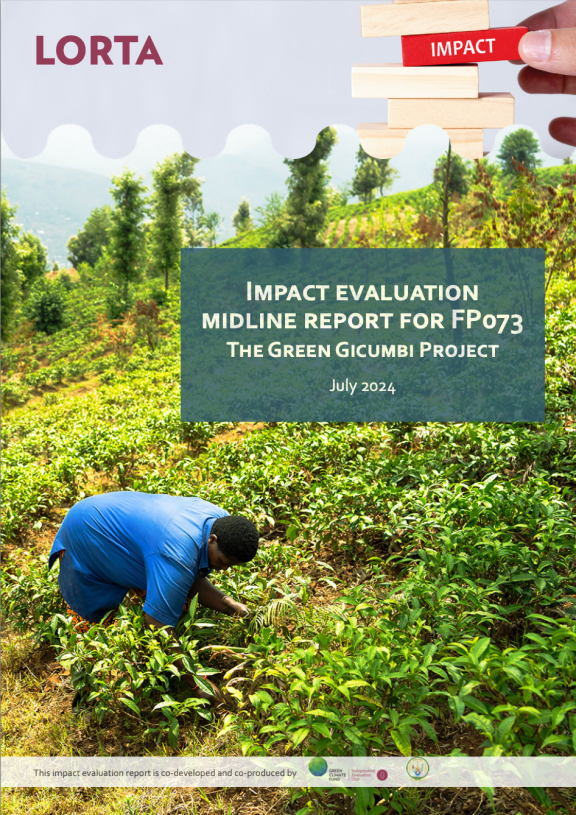
Impact Evaluation Midline Report for FP073 - Strengthening climate resilience of rural communities in Northern Rwanda
01 Jul 2024
This is a midline impact evaluation report of the GCF project FP073 Strengthening climate resilience of rural communities in Northern Rwanda, commonly known as Green Gicumbi Project. The project aims to restore and enhance ecosystem services in one of the sub-catchments of the degraded Muvumba watershed, increase the capacity of communities to renew and sustainably manage resources, and support smallholders to adopt climate resilient agriculture.
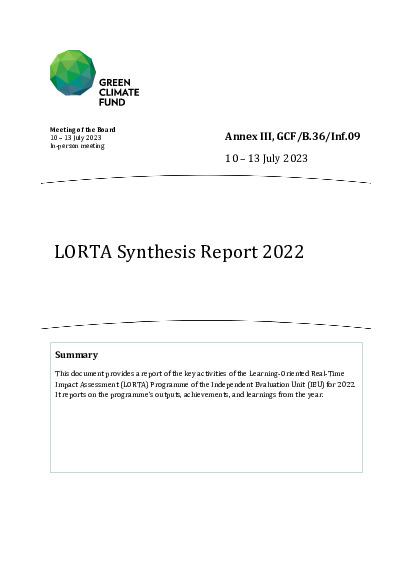
LORTA Synthesis Report 2022
19 Jun 2023
This document provides a report of the key activities of the LORTA Programme for 2022. It is Annex III of a report of the key activities of the Independent Evaluation Unit (IEU) for the period of 1 January to 30 April 2023. It reports on the IEU’s outputs and achievements in line with its Board-approved work plan for 2023.
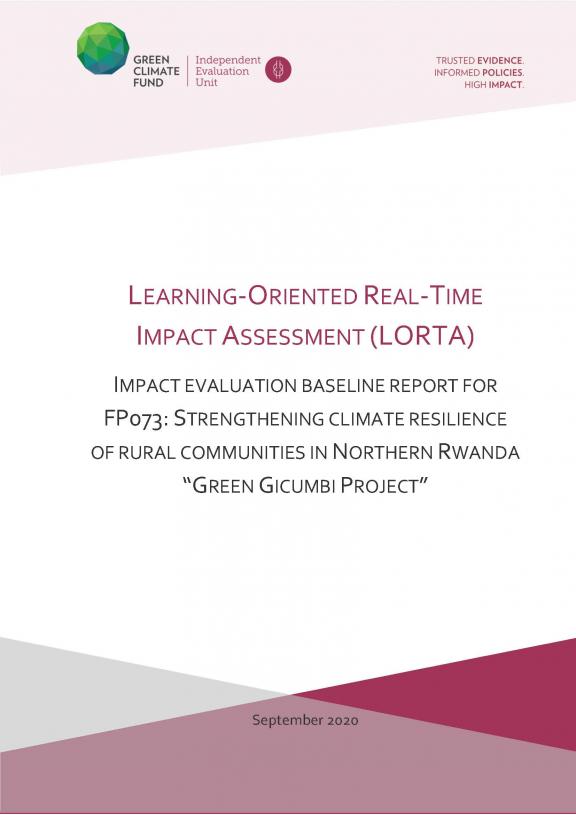
Impact Evaluation Baseline Report for FP073: Strengthening Climate Resilience of Rural Communities in Northern Rwanda "Green Gicumbi Project"
02 Sep 2020
This report presents the findings of the baseline survey for strengthening climate resilience of rural communities in Northern Rwanda commonly known as the "Green Gicumbi Project".
Impact
The midline report presents impact estimates for key project outputs and outcomes, with the eye on assessing the effectiveness of project activities three years after the start of project activities. At midline, data was obtained from 1,258 households from villages in treatment and control sectors.
Female-headed households show a more pronounced adoption of climate-resilient agricultural practices than married households.
At midline, we find that the treatment group have higher adoption rates of climate-resilient agricultural practices. The proportion of treatment households adopting climate-resilient agricultural practices is 20 to 24 percentage points higher than comparison households. Treatment households report adopting around 0.5 more climate-resilient agricultural practices per household.
Results are mixed when it comes to measures of agricultural production. At midline, the intervention enhanced the agricultural production of specific staple crops, specifically beans and sweet potatoes. We found a decrease in banana production among treatment households.
Turning to yields, the only crop that shows a greater yield is beans, with treatment households now yielding an additional 1.72 to 1.78 tons of beans per hectare compared to control areas.
Green Gicumbi project activities increase short-term food security and reduce vulnerability to food shortages. A smaller proportion of treatment households (17.6 percentage points) reported suffering from food shortages in the past year compared to control households. Furthermore, treatment households report lower coping strategies index scores (between 3.3 and 3.6 points lower), indicating that they resort less to harmful strategies in response to food shortages than control households.
In terms of measures of smallholder farmers’ resilience, at midline, we observe no changes in tropical livestock units, or the climate resilience index (using a Food and Agricultural Organization tool). We also observe a decrease in income diversification. Long-run dietary habits do not appear to be affected yet, as there is no difference between treatment and control households concerning household dietary diversity scores.
Impact stories
![]()
Is the GCF targeting the right beneficiaries?
30 Jun 2023 / As mandated by the Paris Agreement, the Green Climate Fund (GCF) supports developing countries realize pathways towards low-emissions and climate-resilient development. These pathways are described in Nationally Determined Contributions (NDCs), which each Party to the Agreement updates every five years. To support this process, the GCF allocates half of its adaptation programming to particularly vulnerable countries: the small island developing States (SIDS), the least developed countries (LDCs) and African States.
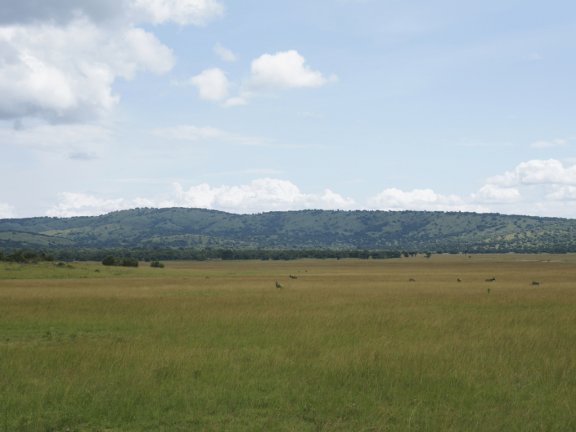
Is the GCF targeting the right beneficiaries?
30 Jun 2023 / As mandated by the Paris Agreement, the Green Climate Fund (GCF) supports developing countries realize pathways towards low-emissions and climate-resilient development. These pathways are described in Nationally Determined Contributions (NDCs), which each Party to the Agreement updates every five years. To support this process, the GCF allocates half of its adaptation programming to particularly vulnerable countries: the small island developing States (SIDS), the least developed countries (LDCs) and African States.
Details
The high number of poor people engaged in subsistence agriculture makes Rwanda particularly susceptible to climate change. This is especially the case for people who have less resources to adapt, including those who farm on marginal land who are highly vulnerable to landslides, flooding and droughts. Strengthening Climate Resilience of Rural Communities in Northern Rwanda is a six-year (15 May 2019 to 14 April 2025) project funded by the GCF and implemented by the National Fund for Environment (FONERWA) through the Ministry of Environment (MoE) of Rwanda as the Accredited Entity to increase the climate resilience of vulnerable communities in nine sectors of Rwanda's Gicumbi District.
Theory of change of project component 1: Watershed protection and climate resilient agriculture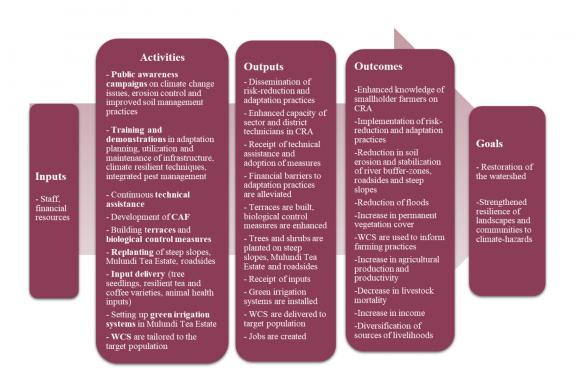
LORTA’s impact assessment focuses on evaluating two sub-components of the project: watershed protection and climate resilient agriculture, and sustainable forest management. A mixed method approach that combines quantitative and qualitative data analysis has been employed.
